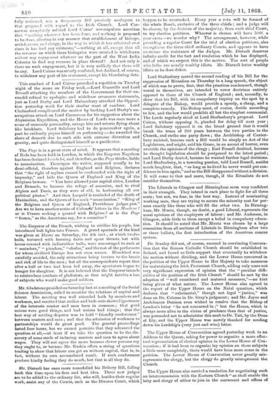Lord Shaftesbury moved the second reading of his Bill for
the suppression of Ritualism on Thursday in a long speech, the object of which was to prove, first, that the practices condemned, though venial in themselves, are intended to cover doctrines entirely opposed to those of the Church of England ; and, secondly, to show that his Bill, with its compulsory inquiry on the spot by a delegate of the Bishop, would provide a speedy, a cheap, and a complete remedy. The Bishop must, of course, decide according to law, and the law would prohibit all but the simplest ceremonial. The Lords regularly shied at Lord Shaftesbury's proposal. Lord Cairns, without opposing it, pleaded for delay till next year ; Lord Salisbury opposed it on the broad ground that it would break the truce of 200 years between the two parties in the Church, and strike one party down ; the Archbishop of Canter- bury resisted, because such a Bill would be simply an Act of the Legislature, and might, said his Grace, in an accent of horror, even override the opinions of the clergy ; Earl Russell doubted, because he thought legislation should be postponed to the latest period ; and Lord Derby denied, because he wanted further legal decisions. Lord Shaftesbury, in a towering passion, told Lord Russell, amidst much laughter, that, " as long as he lived he never would put con- fidence in him again," and so the Bill disappeared without a division. It will come to that and more, though, if the Ritualists do not consider themselves.






























 Previous page
Previous page